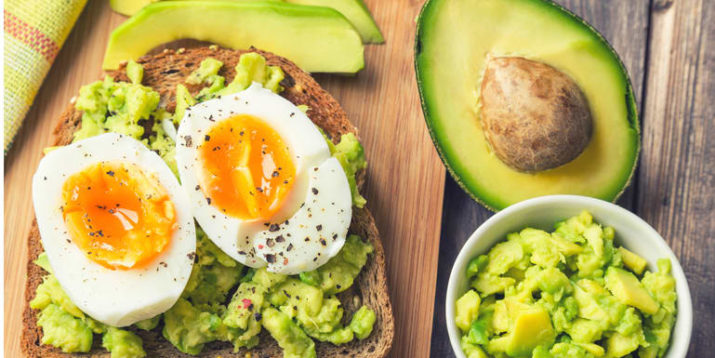Are There Foods That Can Help You Burn Belly Fat?

Let’s start with the bad news: Can adding certain foods to your diet help you burn belly fat without requiring you to do anything else? Sorry, but no.
You’ve probably heard that you can’t “spot reduce” jiggly arms. You can’t spot reduce belly fat either. Not by eating certain foods or by doing crunches all day long. Cue the sad trombone.
What does work, however, is reducing your overall body fat through clean eating and appropriate portion sizes, and following a proper exercise plan that incorporates total-body strength training and cardio.
Speaking of clean eating, here are four types of foods that can help you reach those weight-loss goals and stave off feeling drained and irritable.
Start the Day With Eggs
A protein-rich breakfast is a great way to start the day without the blood sugar crash that can occur if you scarf down a bagel, croissant, or muffin. A 2013 study in the International Journal of Obesity found that teens who ate a high-protein breakfast (35 grams of protein) for 12 weeks tended to consume 400 less calories per day and had lower body fat masses than teens who ate less protein or skipped breakfast daily. Need some egg recipes? Try these 13 Healthy Egg Recipes for Every Meal of the Day.
Spread Coconut Oil
You have heard beauty bloggers touting the skin and hair benefits of applying coconut oil topically, but it also has nutritional benefits. “Coconut oil contains medium-chain triglycerides a type of saturated fat type that are metabolized differently than long-chain triglycerides,” says Dr. Tasneem “Taz” Bhatia.
A study in the American Journal of Clinical Nutrition looked at 31 overweight men and women to see if those who followed a weight-loss plan that included consumption of medium-chain triacylglycerol oils (MCTs) improved their results more than a group who consumed olive oil. The study participants who consumed MCTs lost more weight, and had a greater loss of fat around their belly and hips than those who consumed olive oil.
This doesn’t mean olive oil doesn’t have its own benefits, but you may want to swap it for coconut oil from time to time. “I like to put coconut oil on brown rice cakes in the morning after I have had some protein,” says Dr. Taz. You can also use it for sautéing and stir-frying vegetables.
Eat Other Healthy Fats, Too
The 90’s mentality of eating fat-free everything to shed some pounds and burn belly fat isn’t what health and nutrition experts recommend anymore. (BTW, obesity rates in America started climbing right around that time as well. Coincidence? Probably not considering most manufacturers just replaced fat with sugar.)
Don’t fear fat; just make sure you’re eating the most beneficial types, such as monounsaturated and polyunsaturated fats (including omega-3s, found in fatty fish, vegetable, and seed sources).
“I swear by avocados!” says Dr. Taz. “The heart-healthy monounsaturated fatty acids (MUFAs) in a delicious serving of avocado helps me stay full, which keeps me from snacking too much.” Avocados are packed with vitamins C, K, and B6. Add avocado slices to this Mint and Avocado Green Smoothie; make an avocado toast for lunch, or top off your dinner salad with this heart-healthy fat.
In a randomized, controlled trial out of Penn State University, 121 participants at risk for metabolic syndrome received a daily smoothie containing 1.42 ounces of one of five oils as part their 2,000-calorie daily diet. Those study participants who consumed canola or high-oleic canola oils (MUFAs) daily for one month lowered their belly fat by 1.6 percent compared to those who consumed a flax/safflower oil blend.
Other MUFAs include olive oil, nuts, olives, and nut butters. Just keep in mind that MUFAs, while healthy, are also high in calories.
Consider Probiotic-Rich Foods
You probably know that probiotics have been a buzz-worthy nutrition trend. Kefir, yogurt, and kombucha are examples of foods that are touted to provide probiotics and aide digestion, says Dr. Taz. Not only will good digestion help reduce gas and belly bloat — making your stomach appear flatter and help your pants fit better — but some research looked at probiotics role in weight management.
In a double-blind study published in British Journal of Nutrition, 125 study participants followed a 12-week diet, followed by a 12-week maintenance period. Half of the participants took probiotic pills of the bacteria strain Lactobacillus rhamnosus CGMCC1.3724 (a bacteria used in some of Nestle yogurts in Europe) while the other group took placebos.
Though neither the placebo or the probiotic had an effect on men, the women who took probiotics lost 9.7 pounds, on average, while the women who took the placebos dropped about 6 pounds, on average. After the 12-week maintenance period, the women who took the placebo pills maintained a stable weight, but the probiotics group continued to lose nearly 2 more pounds on average. Further research is needed to confirm these results.
